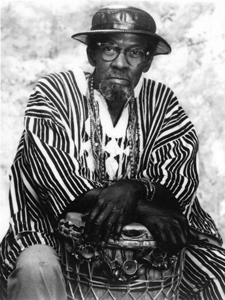Chief Bey facts for kids
Quick facts for kids
Chief Bey
|
|
|---|---|
 |
|
| Born |
James Hawthorne Bey
April 17, 1913 Yemassee, South Carolina
|
| Died | April 8, 2004 (aged 90) Brooklyn, New York
|
| Nationality | American |
| Occupation | Jazz drummer |
James Hawthorne Bey (born April 17, 1913 – died April 8, 2004) was an American musician. He was known as a jazz drummer and percussionist. He also studied and shared African traditions. People knew him best by his stage name, Chief Bey.
About Chief Bey
Chief Bey was a talented musician. He played many kinds of percussion instruments. He also taught others about African culture. His music often mixed jazz with African rhythms.
Early Life and Beginnings
James Hawthorne Bey was born in Yemassee, South Carolina. His family later moved to Brooklyn, New York. Then they moved to Harlem, a famous neighborhood in New York City.
In Harlem, young James started playing drums. He also sang in church choirs. This helped him develop his musical skills. He served in the United States Navy during World War II. After the war, he even went to cosmetology school.
A Career in Music
In the 1950s, Chief Bey became a busy musician. He toured the world with the famous show Porgy and Bess. Big stars like Leontyne Price and Cab Calloway were also in the show.
He started recording music with many artists. He played on albums by Herbie Mann and Art Blakey. He also worked with Harry Belafonte and Miriam Makeba. Chief Bey took his stage name after joining a Muslim group.
He loved to teach about African culture. He taught how to play the shekere. This is a West African percussion instrument. He taught at the Griot Institute in Brooklyn.
Chief Bey passed away in his home in Brooklyn. He was 91 years old.
Chief Bey's Recordings
Chief Bey recorded his own album called Children of the House of God. He also played with many other musicians. He was a sideman on many jazz albums.
He played with artists like Hamiet Bluiett. He also worked with Babatunde Olatunji. Other famous musicians he played with include Ahmed Abdul-Malik and Pharoah Sanders. His drumming added a special touch to many recordings.
 | Percy Lavon Julian |
 | Katherine Johnson |
 | George Washington Carver |
 | Annie Easley |

